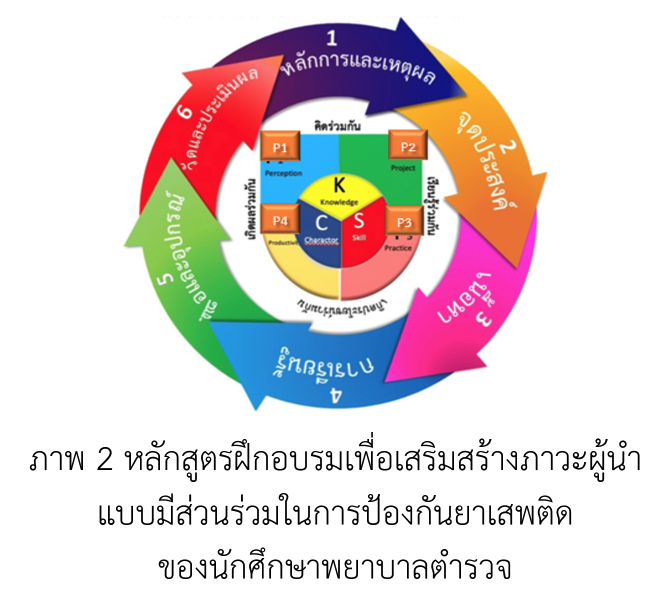THE DEVELOPMENT OF THE TRAINING COURSE TO ENHANCE ENGAGEMENT LEADERSHIP FOR DRUG ABUSE PREVENTION OF POLICE NURSING STUDENTS
Keywords:
training course, engagement leadership, police nursing studentsAbstract
The purposes of this research were to develop and evaluate the training course to enhance engagement leadership for drug abuse prevention of police nursing students. The sample comprised 30 third-year police nursing students, academic year 2022. The research instruments were 1) the interview note with experts examining the components of leadership and training course, 2) the training course to enhance engagement leadership for drug abuse prevention of police nursing students, approved by 5 experts, with the content validity equaled to 1.00, and 3) the evaluation form of engagement leadership for drug abuse prevention in knowledge, skill, and characteristic aspects, approved by the 5 experts, with the Index of item objective congruence (IOC) at 1.00 and with Cronbach's Alpha Coefficient at .82, .81, and .80, respectively. Quantitative data analysis was conducted by the calculation of percentage, mean, standard deviation, paired t-test, and content analysis was used for qualitative data.
The results of the research showed that the training course to enhance engagement leadership for drug abuse prevention of police nursing students exhibited the suitability at the highest level (M = 4.98, SD = .05), and was capable of encouraging engagement leadership for drug abuse prevention of police nursing students in terms of knowledge, skills, and characteristics at the highest level (M = 4.90, SD = .22). Moreover, it was found that after having implemented the training course, the average score of engagement leadership for drug abuse prevention of police nursing students was higher than the average score before implementing the training course, with statistical significance at the level of .05.
Downloads
References
Boonpa, N., Muenjaem, S., Markmee, K., & Pongsriwat, S. (2019). Leadership development in 21st century for high school leader. Sripatum Chonburi Journal, 16(2), 163-174.
Boontiam, N. (2019). The development of health leadership in 3rd level nursing science students, generation 46 of Boromarajonani College of Nursing Sanpasithiprasong. UMT-Poly Journal, 16(2), 101-111.
Chareonwongsak, K. (2017). Children and youth crisis…lack of leadership. Retrieved from http://www.gringsak.com/index_php?components
Chareonwongsak, K. (2018). Super leadership (3rd ed.). Bangkok: Successmedia.
Covey, S. (2002). Servant-leadership and community leadership in the twenty-first century. New York, NY: Wiley & Sons.
Office of the Education Council, Ministry of Education. (2018). Education in Thailand, 2018. Bangkok: PhrikWan Graphic.
Office of the Narcotics Control Board. (2022). ONCB annual report 2022. Bangkok: Office of the Narcotics Control Board.
Oliva, P. F. (2009). Developing the curriculum (7th ed.). Boston: Allyn and Bacon.
Panich, V. (2017). University role: Public engagement. UK. Bangkok: KNIT.
Patphol, M. (2018). Evaluation of curriculum for learning and development (4th ed.). Bangkok: Company Charansanitwong Printing.
Police Nursing College. (2017). Self-assessment report 2017. Bangkok: Police Nursing College.
Ponathong, A., Suvarnasara, C., & Pattrawiwat, K. (2019). Development of change leadership training course for students in higher education institutions. Journal of MCU Peace Studies, 7(2), 332-347.
Sinlarat, P. (2018). Principles of curriculum management and teaching (4th ed). Bangkok: Chulalongkorn University Press.
Sripakho, P. (2014). Professional nursing development: Developing nursing leadership. Journal of Royal Thai army Nurses. Volume 15 (3), 1-8.
Suwanjaroen, J., Patphol, M., & Jamjuree, D. (2022). Confirmatory factor analysis of creative leadership for students of the Bachelor of nursing program faculty of nursing royal institute ministry of public health. Journal of Social Science and Buddhistic Anthropology, 7(6), 334-350.
Taba, H. (1962). Curriculum development: Theory and practice. New York, NY: Harcourt, Brace & World.
Tyler, R. W. (1968). Basic principles of curriculum and instruction. Chicago: The university of Chicago press.
United Nations Office on Drugs and Crime. (2017). World drug report 2016. Retrieved from https://www.unodc.org/doc/wdr2016/WORLD_DRUG_REPORT_2016_web.pdf

Downloads
Published
How to Cite
Issue
Section
License
Copyright (c) 2023 JOURNAL OF THE POLICE NURSES

This work is licensed under a Creative Commons Attribution-NonCommercial-NoDerivatives 4.0 International License.
ผลงานที่ได้ตีพิมพ์แล้วจะเป็นลิขสิทธิ์ของวารสารพยาบาลตำรวจ














